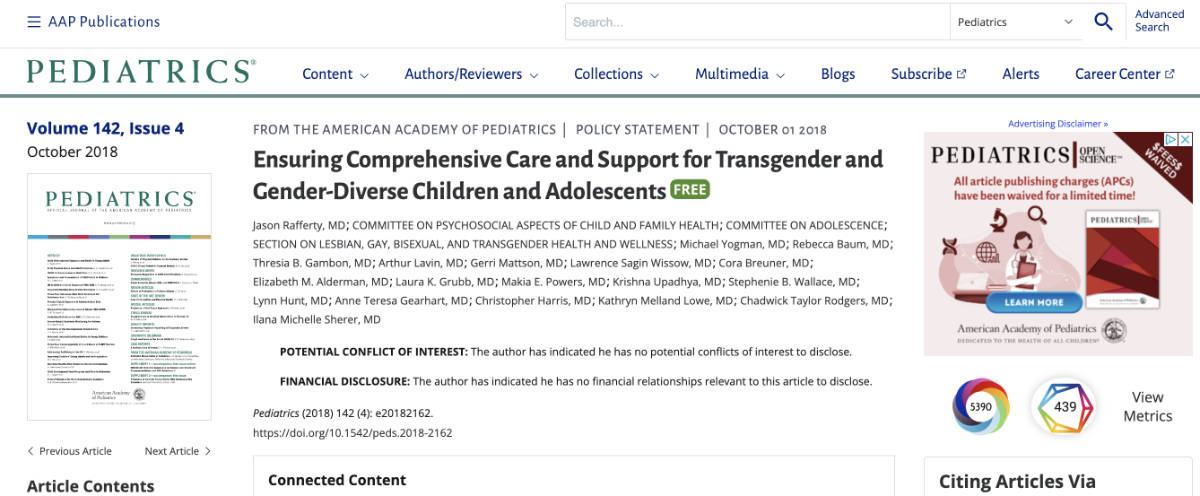The American Academy of Pediatrics (AAP) released a policy statement in 2018 written by 19 co-authors, titled, “Ensuring Comprehensive Care and Support for Transgender and Gender-Diverse Children and Adolescents.” This policy was reaffirmed in 2023 and is mentioned in a letter of concern, signed by the attorneys general of 20 states, regarding “AAP’s Compliance with State Consumer Protection Laws.” The AGs give reasons as to why they believe the AAP’s claim that the effects of “puberty blockers” are “reversible” may qualify as “false, misleading, or deceptive” under state consumer protection laws. Therefore, this claim “requires immediate retraction and correction.”
“Providers rely on the AAP when they make treatment decisions, [and] parents and their children are harmed by the AAP’s misleading and deceptive claim,” the letter states. “When pediatricians are told by the AAP that treating children with puberty blockers is ‘reversible,’ that claim becomes part of the medical discussion and decision making with parents and children.”
As Live Action News has previously noted, the abortion industry is inexorably linked to the lucrative business of “gender-affirming care” — especially abortion industry leader Planned Parenthood. Some of the authors of the reaffirmed 2023 AAP transgender policy statement either have ties to Planned Parenthood or endorse extremely pro-abortion ideas.
This should set off alarm bells for those who believe the AAP is a neutral organization focused on the health and wellbeing of children and adolescents.
The Letter
The September 24 letter to the AAP from the office of Idaho Attorney General Raúl Labrador and signed jointly by the attorneys general of 19 additional states (Alabama, Arkansas, Florida, Georgia, Iowa, Kansas, Louisiana, Mississippi, Missouri, Montana, Nebraska, North Dakota, Ohio, South Carolina, South Dakota, Texas, Utah, Virginia, and West Virginia) as well as the Arizona Senate president and Arizona House Speaker, noted that the Academy’s shift away from science in the area of health for youth who identify as transgender is unacceptable and deceptive.
It reads:
...[F]or the most part, [AAP] has not allowed non-medical considerations to infiltrate its guidance to physicians and parents. But when it comes to treating children diagnosed with gender dysphoria, the AAP has abandoned its commitment to sound medical judgment.
In 2023, it “reaffirmed” the 2018 AAP policy statement on gender-affirming care. That policy statement endorses treating minors diagnosed with gender dysphoria with puberty blockers, cross-sex hormones, and surgical interventions. And it tells physicians, the public, and parents and their children that puberty blockers used to treat adolescents with gender dysphoria are “reversible.”
The letter’s authors note unequivocally, “That statement is misleading and deceptive. It is beyond medical debate that puberty blockers are not fully reversible but instead come with serious long-term consequences,” later adding, “Telling parents and children that puberty blockers are ‘reversible’ at the very least conveys assurance that no permanent harm or change will occur.”
The letter notes that England’s National Health Service (NHS) “commissioned a report to make recommendations for treating minors with gender dysphoria and to ensure that children experiencing gender dysphoria receive high-quality care that is safe, holistic, and effective.” This is referring to the Cass Report, which found “several possible irreversible consequences” of administering “puberty blockers” to children during or before puberty, including:
(1) may interfere with neurocognitive development;
(2) compromise bone density and may negatively affect metabolic health and weight; and
(3) block normal pubertal experience and experimentation.8 And when puberty blocker use is followed directly by cross-sex hormone use, which is often the case, infertility and sterility is a known consequence, at least for those who began puberty blockers in early puberty.
The letter adds that the “cornerstone source” for the AAP’s information — the World Professional Association for Transgender Health (WPATH) — has been “exposed as unreliable and influenced by improper pressures.” The public officials are “additionally concerned” that the AAP has exerted pressure upon WPATH to make changes to its current standards of care “based on political considerations” while “assuring the public that those same standards are ‘evidence-based.'”
The authors point out that not even the World Health Organization endorses “puberty blockers” or other “gender-affirming care” for children, and that many nations “are intervening to protect children against these untested treatments” which are not backed by proper research. They have requested the AAP to respond to 14 different questions no later than October 8. The letter and questions may be read here.
The Policy’s Authors

AAP 2018 Transgender Policy authors
Lead author uncertain about reversibility?
Jason Rafferty, MD, lead author of the AAP’s transgender policy statement originally published in 2018 and reaffirmed in 2023, also authored a 2019 AAP-published commentary regarding “fertility preservation outcomes and considerations” for youth who consider themselves to be transgender. Though the full commentary is not available to non-AAP members, the viewable portion of the introductory statement contains some interesting information that may lend credence to the idea that the effects of “puberty blockers” cannot truthfully or reliably be called “reversible” due to a dearth of research.
“Transgender and gender-diverse adolescents and young adults (TGD-AYA) increasingly present to health care providers seeking medical affirming interventions (MAIs) to induce physiologic changes aligned with their gender identity,” begins the 2019 commentary. “MAIs include gonadotropin-releasing hormone agonists to temporarily suppress puberty [“puberty blockers”]… [etc]. There is considerable concern that these MAIs impact gonadal structures and function, thereby decreasing future fertility potential. Little research has explored reversibility or thresholds (amount and/or duration) of MAIs in impacting TGD-AYA fertility. Therefore, multiple professional organizations recommend fertility counseling before MAI initiation” (emphases added).
Some of that fertility counseling appears to include encouraging biological males to preserve their semen before undergoing “MAIs.”
Again, note that the AAP’s policy statement (with Rafferty as lead author) was first published in 2018, one year before Rafferty’s commentary. And yet, it appears that Rafferty was aware that “little research ha[d] explored reversibility” of the impact of “puberty blockers” on “future fertility potential” at that time.
Therefore, AAP’s 2018 policy statement claiming that the effects of “puberty blockers” are “reversible” could not have stated this with certainty, with Rafferty admitting a year later that there was “considerable concern” and “little research” about the drugs’ potential impacts on fertility.
Co-authors promoted children’s ‘right’ to abortion – without parental involvement
Two of the co-authors of the AAP transgender policy statement — Cora Breuner, MD and Elizabeth M. Alderman, MD — also co-authored an August 2022 policy statement for AAP (issued just two months after Roe v. Wade was overturned by the U.S. Supreme Court) endorsing the idea that minors have a “right” to obtain abortions without parental knowledge or permission, stating that involving parents “pose[s] risks to adolescents’ health” and may “increas[e] volatility within a family,” causing “harms.”
Part of the policy statement reads, “The legal climate surrounding abortion law is rapidly becoming more restrictive and threatens to adversely impact adolescents. Mandatory parental involvement, the judicial bypass procedure, and general restrictive abortion policies pose risks to adolescents’ health by causing delays in accessing medical care, increasing volatility within a family, and limiting their pregnancy options. These harms underscore the importance of adolescents’ access to confidential abortion care.”
In other words, parents are the enemy and the children are safer with abortionists. This philosophy is very common among abortion advocates, including industry leader Planned Parenthood.
Breuner is reportedly a physician at Seattle Children’s Hospital in the division of Adolescent Medicine; Alderman is Professor of Pediatrics and Obstetrics & Gynecology and Women’s Health at our Albert Einstein College of Medicine, according to her bio, and specializes in adolescent gynecology and reproductive health for adolescents.
Co-author worked for Planned Parenthood Federation of America
Krishna Upadhya, MD, another co-author of the AAP’s transgender policy statement and a 2020 AAP award winner, was at the time of her award “the senior medical adviser at Planned Parenthood Federation of America,” and was “a member of the Committee on Adolescence” with the AAP until 2021.

Dr. Krishna Upadhya (Screenshot: 2020 AAP Award Winners)
According to LinkedIn, Upadhya worked for Planned Parenthood Federation of America for over four years; she was the Vice President of Quality Care and Health Equity at PPFA from October 2020 until July of 2023, and now reportedly works as the Chief Medical Officer in the Delaware Division of Medicaid and Medical Services.
Several co-authors also wrote AAP’s policy statement on counseling pregnant adolescents
The aforementioned Drs. Breuner, Alderman, and Upadhya — along with Laura K. Grubb, MD and Makia E. Powers, MD, also co-authors of AAP’s transgender policy — additionally wrote AAP’s “Options Counseling for the Pregnant Adolescent Patient” just a year prior in 2017.
In the policy statement, they claim that “medical and surgical abortions are safe when performed by licensed and experienced physicians” — and yet, research has shown that “medical” (abortion pill) abortions carry a four times greater risk for women than a first-trimester surgical abortion. Additionally, “licensed and experienced physicians” who commit abortions have been declining for quite some time, with multiple states attempting to increase abortion access by allowing non-physicians to commit even first-trimester suction-aspiration and D&C abortions. Women have died from legal first-trimester abortions by pill as well as surgically — even with physician involvement.
The authors also claim “the mortality associated with childbirth is many times higher than that associated with legal abortion” (debunked here), and claim that “Concerns about… infertility, increased cancer risks, or mental health issues, are not supported by current evidence.” And yet, several studies have shown the opposite about each of these.
Surprisingly, the physicians writing the 2017 policy admit that “feelings of grief and loss can follow an abortion, and the pediatrician should be prepared to offer resources for emotional support after the procedure.”
However, the AAP’s most recent September 2022 policy statement on pregnancy options counseling for adolescents (with co-authors including the aforementioned Drs. Alderman and Grubb) has added some disturbing new elements, in addition to maintaining the tenuous claims about abortion safety, childbirth, and abortion risks from the 2017 policy.
The new policy stunningly claims that “abortion provision is within the scope of practice of pediatrics, and training is available for pediatricians to provide abortion care” (emphasis added).
It also claims that “denying women abortion services provokes anxiety and stress,” and that “not being able to obtain a wanted or needed abortion leads to economic insecurity for women and their families and negatively impacts existing children’s economic and emotional well-being.” These claims are sourced to studies co-authored by Diana Greene Foster, author of the completely unreliable “Turnaway Study,” which the abortion industry and its media allies continue to tout as if it isn’t full of holes. (Good propagandists know that repeating a lie often is the key to making people believe it.)
Things to consider
Any actions taken upon a minor’s body that may negatively impact his or her future fertility or potentially cause sterility are something to which that child cannot truly give informed consent. And yet, here we see that the pro-abortion and transgender ideologies are extremely similar; their proponents insist that children can fully consent to life-altering procedures that may have a devastating impact on their future ability to produce biological children.
In the majority of states, permanent sterilization is restricted to legal adults; 33 states require that a woman must be 21 years old to legally receive a tubal ligation, while most states require a man to be 18 to legally consent to a vasectomy (which may be reversible) unless done in a “medical facility that receives federal funding” like a hospital system. In that case, men must be 21.
Surely, administering “puberty blocking” drugs into the body of an immature, still-developing adolescent is not something to be taken lightly — especially not when there is a total absence of long-term studies to prove their safety.







